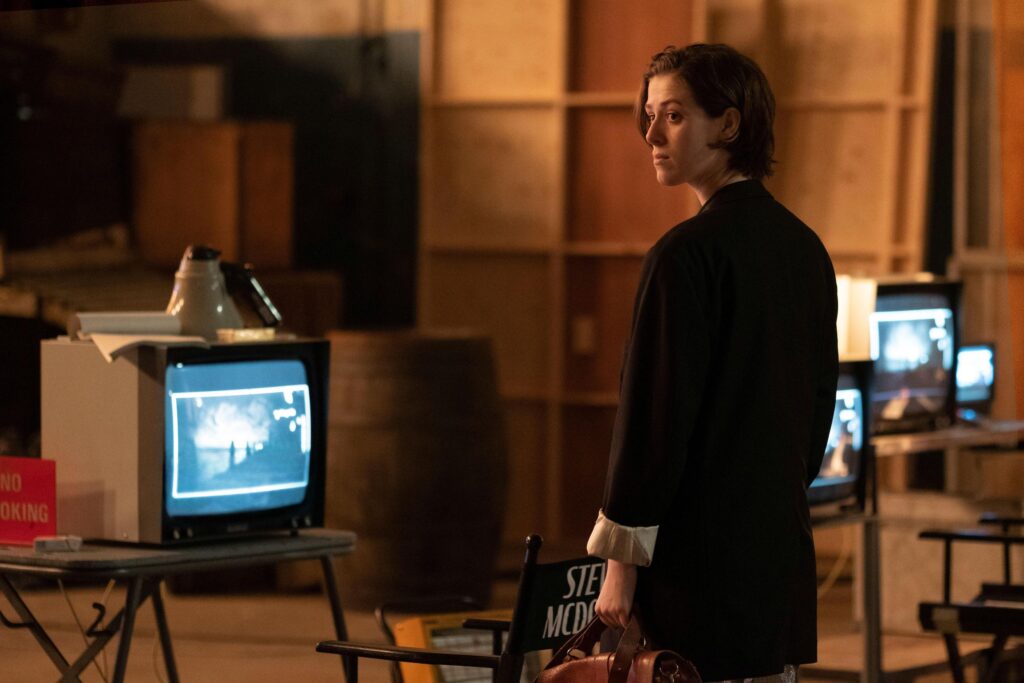With The Souvenir Part II, Joanna Hogg completes an unusually beautiful triumph of cinematic self-indulgence.

Welcome to a golden era of Hollywood nepotism. Licorice Pizza and The Souvenir have both seen directors dip into their best friends’ gene pools and emerge with critical hits on their hands. This is somewhat more impressive in the case of Honor (daughter of Tilda) Swinton Byrne considering the 24-year-old is not a trained actor but a psychology student, plucked from her job as a florist by her godmother Joanna Hogg, who cast Tilda and Honor as mother and daughter in her semi-autobiographical Souvenir saga. Incestuous as it sounds, it is impossible to imagine more perfect casting short of breeding someone specifically for a role.
We first meet well-to-do film student Julie (Swinton Byrne) in Sunderland where she is pitching a gritty drama set in the deprived port area. Fact-finding soon becomes gaslighting when she meets Anthony (Tom Burke), a culture vulture and financial mosquito constantly borrowing money from Julie despite apparently working for the Foreign Office. Burke (also from an acting family) basically plays a posh version of his manipulative boyfriend character from True Things, but this toxic relationship is not so easily dismissed. Hogg lets us in on the couple’s lives not as voyeurs watching the drama but as collaborators living it, helping us understand the complexity and honesty of Julie’s love for this troubled man.
Based on her own experiences at film school in the 1980s, Hogg shows Julie facing pushback from the faculty staff over her Sunderland project. “It would be much better for you to work from your own experience,” is the advice she takes on board some 40 years later, bringing to bear her decades of expertise; not necessarily wisdom (the themes are too irreducible to draw any kind of lesson) but certainly creative maturity and technical skill. Every shot is beautifully composed and few scenes are longer than 20 seconds, making the film mercurial and enigmatic, full of moments whose significance are not immediately apparent but together weave a beguiling kind of living tapestry. David Raedeker’s cinematography gives the screen the translucence of backlit papyrus, as though glimpsing shards of memory through the brittle fibres of time.
If the Knightsbridge setting and BBC Films emblem suggest a cosy viewing experience, that is only half-right. Both movies are a pleasure to watch yet surprisingly disquieting, haunting even. Tension arises not from the usual family-drama avenues of having generations at each other’s throats – in fact, the characters are all consistently nice to each other. The most shocking incident in Part II is when something falls off a shelf; hardly high drama but in context, it might as well be Keanu Reeves jumping out of a plane without a parachute in Point Break. Hogg also avoids the usual pitfalls involving wealthy characters complaining about their problems, either by making the problems real or the complaints comedic, especially Richard Ayoade’s hilarious turn as a pretentious filmmaker: “You’re forcing me to have a tantrum!”
The Souvenir cannot ignore its characters’ privilege – on the contrary, it is hyper-aware of the matter and makes it highly relevant, particularly in the film’s self-referential inquiries into the purpose of cinema. Does Julie’s background preclude her from making a film about deprivation? Would that picture have more value than this self-reflective art film? If you find these questions irrelevant then for god’s sake save yourself four hours, and expecting concrete answers from this duology is like trying to catch raindrops in a butterfly net. Perhaps the most meta film series since Scream, the movies are their own response to the queries they raise. Part II is almost a Honey Boy-style form of cinematic therapy, a deconstruction of the events of Part I that sees Julie cast actors to play herself and Anthony à la Charlie Kaufman’s Synecdoche, New York.
Somewhere along the line, the film-within-a-film breaks free of its crafty confines, crossing the line between fiction and reality to remind us of the simple yet elusive fact that we were watching a film in the first place. Semi-improvised, overlapping dialogue and contemporary pop songs by Joe Jackson and The Specials give the impression of being right there in Julie’s flat with her, even when it turns out you are not. Along the way, it pays homage to Kaufman, Powell and Pressburger, and Derek Jarman, an early mentor to Hogg and close friend to Tilda Swinton. Those close connections add to the film’s natural intimacy; Swinton breezes through scenes with dogs at her heels, opposite a magnetic Swinton Byrne, whose subtle performance as Julie has the complete effect of watching a real person live and breathe. Where so many films skim the surface or lean on clichés, Hogg embarks on no less than a total exploration of her characters, part of what Ayoade’s filmmaker calls “avoiding the temptation to be obvious.”
Of course, it is beyond self-indulgent, a triumph of self-indulgence; a self-portrait by a master, emotionally honest before all else, with the formal precision and artistic vision to back it up. It tells a story first and deconstructs it second, with none of the glibness found in Licorice Pizza or laziness that has descended on Quentin Tarantino. Hogg uses the form as Hitchcock and Welles once did, examining the same events but from different angles, even beginning and ending in the same place through a lens of shifting perspective. The Souvenir is a memento of times past yet still moving, a concept impossible to describe beyond the language of cinema.
Dan Meier is a freelance writer, editor and critic based in London.







